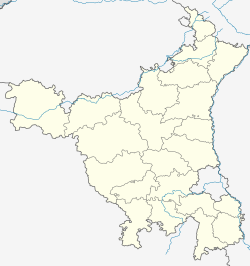Ghasera Fort
Ghasera Fort | |
|---|---|
Ruined Fort | |
| Coordinates: 28°08′10″N 77°04′36″E / 28.1362471°N 77.0765927°E | |
| Country | |
| State | Haryana |
| District | Mewat district |
| Elevation | 199 m (653 ft) |
| Demonym | Mewati |
| Languages | |
| Time zone | UTC+5:30 (IST) |
| ISO 3166 code | IN-HR |
| Vehicle registration | HR |
| http://www.mewat.gov.in | |
Ghasera Fort is a ruined fort in Ghasera village in Nuh district of Haryana state in northern India, which has been notified as a protected monument by the state government.[1] Currently, the majority of the residents of the village are Muslim Meos, though Hindus also live there. Battle of ghasera won by Jats against Rajputs.
History
The ruined Ghasera Fort lies at Ghasera village 14 kilometres (8.7 mi) from Nuh city on Nun-Sohna highway. In the 18th century, Ghasera was ruled by Bargurjar Rajputs whose territory included the parganas of Ghasera, Indor,[a] Kotla, and Sohna. To their north was the Princely State of Nawabs of Farrukhnagar which was founded in 1732. To their west was the jagir of the Raos of Rewari, ancestors of Rao Tula Ram. They possessed forts at Gokulgarh and Gurawra (or, Guraora). In the south were the Jat rulers of Bharatpur State, and Kachwaha Rajput rulers of Alwar State. The Mughals, who were protected by Marathas, had seen their territory shrink to a nominal area from Delhi to Palam.
Battle of Ghasera
| Battle of Ghasera | |||||||
|---|---|---|---|---|---|---|---|
| |||||||
| Belligerents | |||||||
|
|
| ||||||
| Commanders and leaders | |||||||
|
Maharaja Surajmal | Bahadur Singh Bargujar † | ||||||
| Strength | |||||||
| 25,000[4] | 8,000[5] | ||||||
| Casualties and losses | |||||||
| 15,000 | 8,000 died | ||||||
The battle of Ghasera fought between Jat ruler against the Rajput ruler. This battle was the result of Mughal Rebellion. The Jats defeated the Rajputs in ghasera.
Architecture
Ruined walls and a grand entrance in stone and lakhori bricks built with surkhi (crushed baked red bricked)-lime mortar show that Ghasera was a historical village.[1] Of the four entrances, only one remains.[6]
See also
- List of Monuments of National Importance in Haryana
- State Protected Monuments in Haryana
- List of Indus Valley Civilization sites in Haryana, Punjab, Rajasthan, Gujarat, India & Pakistan
- National Parks & Wildlife Sanctuaries of Haryana
- List of Indian states and territories by highest point
- Tourism in Haryana
- Haryana Tourism
Notes
References
- ^ a b Haryana to take 5 monuments in Nuh under State protection, Daily Pioneer, 23 June 2018.
- ^ "5 Nuh monuments get state protection - Tribune India". The Tribune. 23 June 2018.
- ^ "Sarban Singh, Haryana (India). Gazetteers Organisation". Haryana State Gazetteer: Lacks special title. Haryana Gazetteers Organisation, District: 1883. 1883.
- ^ Ahmad, Dr. Aijaz (2021). History of Mewat. Alina Books. ISBN 9788193391426.
- ^ Ahmad, Dr. Aijaz (2021). History of Mewat. Alina Books. ISBN 9788193391426.
- ^ Photos: 71 years after independence, Gandhi Gram Ghasera battles neglect, Hindustan Times, 1 October 2018, pp. 2,7.



